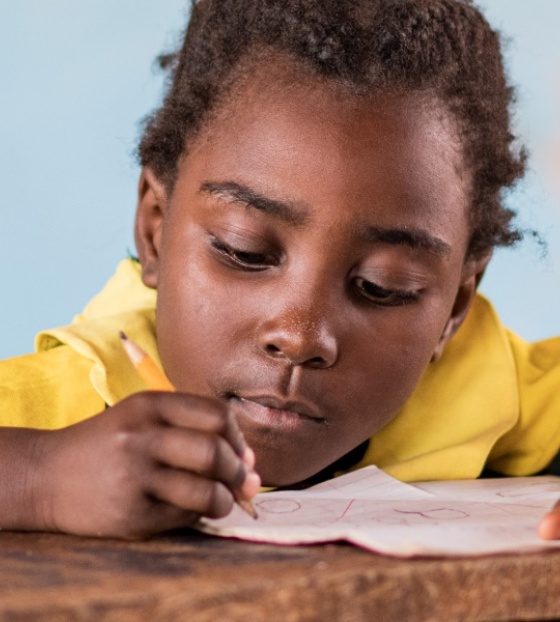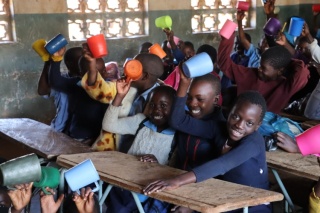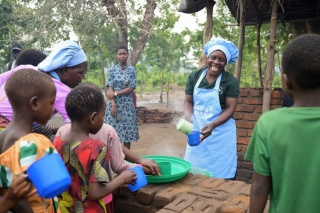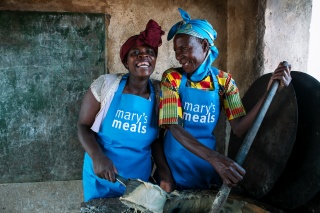
The community-led school feeding approach that drives Mary’s Meals
It's more than just a meal – it's the potential for a better, brighter future.
Mary’s Meals is a simple idea that works. By providing a daily meal in school, our programme encourages children experiencing poverty into the classroom where they gain an education that can provide opportunities for a better life.
Children are at the heart of our work. Our vision is that every child receives one daily meal in their place of education and that all those who have more than they need, share with those who lack even the most basic things. We have been delivering community-led school feeding programmes for more than two decades, and we continuously develop and refine our approach to reach as many children as possible in the most efficient, effective and sustainable way.
Our unique model revolves around a partnership between schools, local communities, and Mary’s Meals. With our support, school staff and local volunteers work together on the day-to-day running of the programme, ensuring each child safely receives the correct meal every school day and is respected and protected.

Providing a daily meal to vulnerable children in their place of education
We work in areas where children experience high levels of poverty, food insecurity, and malnutrition, where providing a daily meal in school encourages increased school enrolment and attendance rates. We have a deep resolve to reach children who live in particularly challenging, unstable, and food-deficient areas.
All our programmes provide one daily meal for each child in their place of education, contributing to their nutritional needs, alleviating immediate hunger, and supporting their education.
The promise of a daily meal promotes inclusion by enabling children who are marginalised, vulnerable, or living in poverty to enrol in school and attend consistently, and the community-led programme helps to foster a spirit of hope and collaboration throughout the school.
Partnering with communities, schools, and local organisations
Equal, long-term partnerships between communities, schools, Mary’s Meals and our partner organisations are central to our model.
Local communities take on the day-to-day running of our programme with our support, so before we begin serving in a new place of learning, we work with the school and surrounding community to ensure that they can commit to what’s required.
We encourage parents, teachers, and other community members to establish a school feeding committee, which will be responsible for managing the programme (including ensuring there are enough volunteers to prepare and serve the meals), resolving any issues, and promoting school feeding within the community. Mary’s Meals staff and partners provide training, resources, monitoring, and support to schools and volunteers.
Tens of thousands of volunteer cooks provide resources and commit their time to prepare and serve our meals daily. This strong community ownership helps to build capacity for potential local delivery of successful school feeding in future, while increasing the cohesion between the school and the local community and promoting better understanding of the importance of education.
Our main focus is on supporting pre-school and primary children to thrive and learn, because we know that children who are supported in early years and primary education will have more opportunities available to them in the future.

Delivering consistent, high-quality school feeding programmes
In each country where we work – either directly or through a local partner – we agree with schools and communities which foods should form the basis of a locally appropriate and nutritious school meal, often fortified with vitamins and minerals.
Local food procurement happens centrally and at scale, helping to ensure a timely and consistent supply of good quality food for the meals. Our staff and partner colleagues work hard to manage the food supply and monitor the programme, making sure that every school receives and serves the right quantity of food.
We ensure that schools and communities have the knowledge, skills, equipment, and support they need to be able to take ownership of school feeding and implement the programme in alignment with our policies and model. School Feeding Officers monitor stock and programme implementation, supporting the school feeding committee and helping to maintain good practices as well as identifying solutions if challenges arise.
We find that our work often acts as a platform to support further change and improvement in the school environment, since school feeding committees are well-placed to engage with other positive interventions, for example, initiatives relating to children’s health or the environment.
Sourcing locally grown food and minimising environmental impact
The vast majority of all the food purchased by Mary’s Meals is grown in the countries where we work. Where possible, we focus on purchasing equipment locally and working with local food suppliers who buy from smallholder farmers, helping to support farmers and their families, and encouraging economic growth. When good quality, locally grown food is not consistently available, we use alternative options, while continually pursuing opportunities for local procurement.

Making a long-term commitment in the countries where we work
Wherever we work, we prioritise children’s needs, making a long-term commitment to providing school meals, and working with governments to support the development of sustainable national school feeding programmes.
Our work is strongly supported by governments and aligned with national development priorities. We work closely with appropriate government representatives throughout the design and implementation of our programmes, taking opportunities to promote our model, share knowledge, and help build capacity, continually emphasising our respective responsibilities.
Building brighter futures
Finally, we see our work as more than just providing meals – it’s about bringing hope.
Our approach is practical and values-driven. By mobilising local communities and supporters across the world, we are relying on the innate goodness of people to feed children in school and, in doing so, help them to build brighter futures.
Together, we can make our vision a reality. Thank you for standing with us in our belief that every child should receive a daily meal in their place of education.